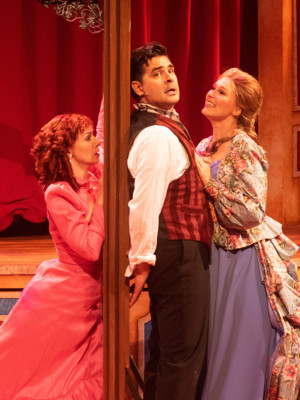Review: A GENTLEMAN'S GUIDE TO LOVE AND MURDER at Solvang Festival Theatre

George Walker as Monty Navarro
Skye Privat as Phoebe D'Ysquith
A friend remarked to British actor, Edmund Gwenn, on his deathbed "This must be very hard," to which Gwenn replied, "It is. But not as hard as farce." PCPA's production of A Gentleman's Guide to Love and Murder met the challenge of the dangerously delicate timing demanded of a musical farce. Set in England in the Edwardian period, lowly office clerk, Monty Navarro (George Walker), discovers that, through his mother's line, he is connected to the aristocracy as a member of the D'Ysquith family. With eight D'Ysquiths standing between him and an Earldom, he makes his way through his family tree by what Lady Macbeth referred to as "the nearest way," discreetly murdering his way to the top.
The musical delivers its material in a heightened and mannered style, which has the effect of making all the D'Ysquith deaths thoroughly comic. The songs are reminiscent of the quick and witty patter of Gilbert and Sullivan and have the catchy appeal of the saucy songs of the British music hall. For example, in "Why Are All the D'Ysquiths Dying," the chorus ponders the curious deaths of the D'Ysquiths:
Why are all the D'Ysquiths dying?
When truth to tell so many others should.
Though
Privately it was said
They should all drop dead,
No one thought
They ever really would.
All the dying D'Ysquiths are portrayed by PCPA resident artist, Andrew Philpot, who handles the roles with breathtaking virtuosity, precise comic timing and inventiveness. As the foppish young Henry D'Ysquith, for example, Philpot concentrates the offensive superciliousness of the D'Ysquith's by reclining his head as he casually writes Monty off with a tip of his straw boater hat. Henry's sneering manner is all the audience needs to root for Monty's murders. As played by George Walker, Monty has an appealing charm that wins our sympathy.
While the "murder" side of A Gentleman's Guide to Love and Murder is greatly entertaining, the love plots, are more peripheral. In the source material, Monty's married lover, Sibella (Emily Trask), directly reverses the plot. Here, the more removed love story makes way for the essential pairing of Monty and each murder victim. Keeping focus on imaginative visual story-telling and comic timing. For example, when Monty visits his distant cousin, the elderly, inebriated Reverend Lord Ezekial D'Ysquith, in his church, George Walker and Andrew Philpot transform the stairway up to the third and fourth level of the set into a perilously narrow and slippery church tower by treating it as such physically and emotionally. The comic tension escalates as the drunken clergyman ascends to the top of the roof while Monty meditates on his moral quandries over murder. The result is fully farcically fun. The scenes that follow match the comedy of this early one, making for a hilarious evening's entertainment.
Reader Reviews

Videos

